#pompey magnus
Text

A Group of Men Standing before Caesar and the Severed Head of Pompeius, from Livre de Bonnes Meurs
French, c. 1430
tempera colors, gold leaf, gold paint, and pen and ink
J. Paul Getty Museum
#illumination#illuminated manuscript#miniature#Julius Caesar#Pompey#Pompey Magnus#French#manuscript#art#painting#J. Paul Getty Museum#Getty Museum
60 notes
·
View notes
Text
Pompey the Great assassinated, September 28th, 48 BC
Upon landing in Egypt, Roman general and politician Pompey is murdered on the orders of King Ptolemy of Egypt.
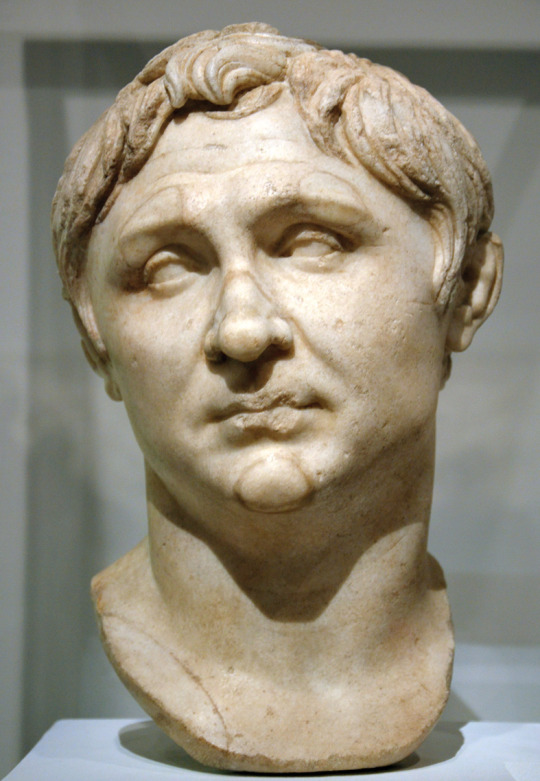
During his long career, Pompey the Great displayed exceptional military talents on the battlefield. He fought in Africa and Spain, quelled the slave revolt of Spartacus, cleared the Mediterranean of pirates, and conquered Armenia, Syria and Palestine. Appointed to organize the newly won Roman territories in the East, he proved a brilliant administrator.
In 60 B.C., he joined with his rivals Julius Caesar and Marcus Licinius Crassus to form the First Triumvirate, and together the trio ruled Rome for seven years. Caesar’s successes aroused Pompey’s jealousy, however, leading to the collapse of the political alliance in 53 B.C. The Roman Senate supported Pompey and asked Caesar to give up his army, which he refused to do. In January 49 B.C., Caesar led his legions across the Rubicon River from Cisalpine Gaul to Italy, thus declaring war against Pompey and his forces.
Caesar made early gains in the subsequent civil war, defeating Pompey’s army in Italy and Spain, but he was later forced into retreat in Greece. In August 48 B.C., with Pompey in pursuit, Caesar paused near Pharsalus, setting up camp at a strategic location. When Pompey’s senatorial forces fell upon Caesar’s smaller army, they were entirely routed, and Pompey fled to Egypt.
Pompey hoped that King Ptolemy, his former client, would assist him, but the Egyptian king feared offending the victorious Caesar. On September 28, Pompey was invited to leave his ships and come ashore at Pelusium. As he prepared to step onto Egyptian soil, he was treacherously struck down and killed by an officer of Ptolemy.
#pompey#pompey magnus#gnaeus pompeius magnus#first triumvirate#ptolemaic egypt#rome#ancient rome#roman republic#roman history#roman empire#julius caesar#gaius julius caesar#pompey the great#history#ancient history
20 notes
·
View notes
Text

Wot's all this then? (10 seconds before he's murdered)
14 notes
·
View notes
Text
"pompey looks that wide because he just gobbled up territories ya know"- antiquity politics prof
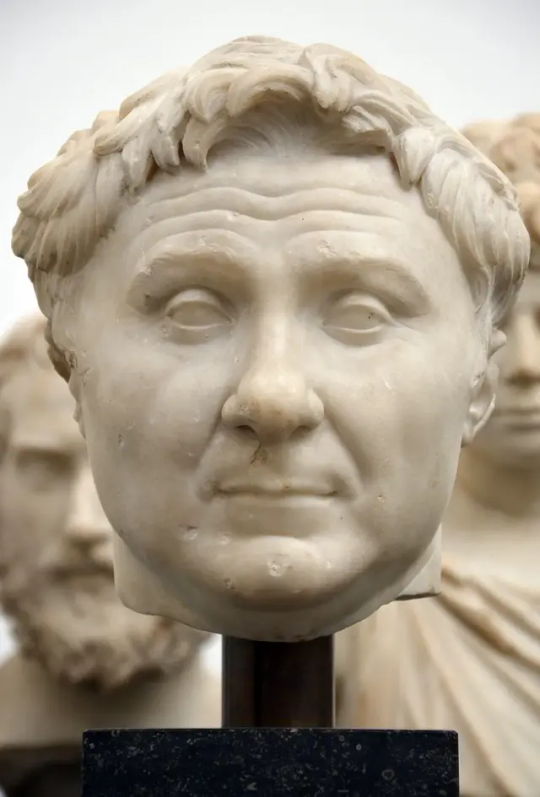
photo from encyclopedia britannica
5 notes
·
View notes
Text
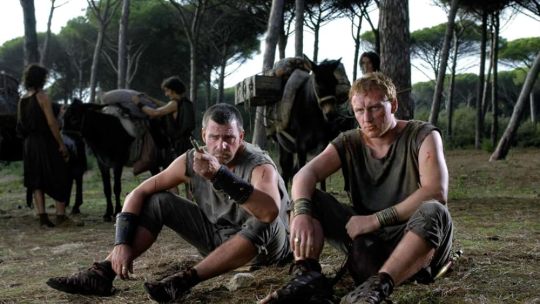
Kevin McKidd and Ray Stevenson in Rome (2005) Pharsalus
S1E7
As they try to reach Caesar in Greece, the shipwrecked Vorenus and Pullo confront an unexpected dilemma. Back in Rome, Atia again sends Octavia to beg protection from Servilia, who complies readily to encourage her growing friendship with Octavia. As they prepare their counterattack against Caesar, Pompey's Republicans begin to squabble over both the anticipated spoils and the method of finishing Caesar off. Niobe's sister Lyde comes back to see her and comforts her over Vorenus's disappearance.Badly outnumbered, Caesar and Antony make their stand at Pharsalus. On his arrival in Egypt, Pompey is greeted by a Roman veteran.
#Rome tv series#2005#Pharsalus#Ceasar#Pompey Magnus#Battle at Pharsalus#Greek campaign#ancient world#action#drama#romance#S1E7#tv series#Rome#Romans#Kevin McKidd#Ray Stevenson#just watched
1 note
·
View note
Text
Well... I was writing a fiction but then, somehow, I got sucked down a rabbit hole and ended up writing a whole Wikipedia entry instead. 🤦♀️
This is not the first time and alack, I can almost promise it won't be the last.
In case anyone cares to know a few things about a random Roman of the Plautii gens, here it is:
Publius Plautius Hypsaeus
Publius Plautius Hypsaeus was a politician of the Roman Republic during the first century BCE.
He was probably the son of Marcus Plautius Hypsaeus, consul 125 BCE [Syme, p.87.] who, in 73 BCE, prosecuted Marcus Crassus for incestum with a Vestal Virgin.
Hypsaeus was quaestor sometime around 60 BCE under Gnaeus Pompeius Magnus, and he was said to have had his amicitia (friendship/political backing) [Asconius, C.16–18, Syme, p.255.] He was Aedile Curulus in 58 BCE [Syme, p.492] and Praetor in 55 BCE [CIL 1.159 ILLRP 386].
In 52 BCE, Hypsaeus was one of three men – alongside Titus Annius Milo and Quintus Metellus Scipio – who campaigned for the consulship in 52 BCE.
Their campaign was divisive, involving extensive bribery of the people and the formation of armed gangs loyal to each candidate. The open hostility was particularly marked between Publius Clodius Pulcher and Titus Annius Milo. Milo, backed by Cicero, was on one side, while Clodius and both Hypsaeus and Scipio were on the other. Their open violence culminated in the murder of Clodius and the burning down of both the Curia Julia and the Basilica Porcia in the Forum Romanum.
In consequence, the elections for the consulship and praetorship could not be completed, and Gnaeus Pompeius Magnus was made sole Consul for the year.
One of his acts in this position was to propose trials for several offences, in particular the giving and receiving of bribes. He allowed that anyone who wished to could call anyone to account for a period of almost twenty years, specifically since his first consulship. [Appian, 2.23]
Hypsaeus was one of a number of prominent citizens to be prosecuted under these new laws.
Pompey, despite their amicitia, was quick to abandon Hypsaeus during the prosecution for electoral malpractice in the following way: While he was coming from his bath, Hypsaeus threw himself at his feet, begging for help as a nobleman and a friend. Pompey insulted him, and walked away, saying that he was keeping him from his dinner. [Valerius Maximus 9.5; Plutarch, Life of Pompey, 55.]
He was found guilty and exiled. Only Milo, exiled under the same law, had his wealth confiscated. [Appian 2.23.]
Sources:
Valerius Maximus, Memorable Doings and Sayings.
Marcus Tullius Cicero, Pro Milone.
Quintus Asconius Pedianus, Commentary on Cicero’s Pro Milone.
Plutarch, Life of Pompey.
Appian, The Civil Wars.
Ronald Syme, The Augustan Aristocracy.
John T Ramsey How and Why was Pompey Made Sole Consul in 52 BCE?, Historia (Jstor) 65, 2016/3 298-324.
Martin Stone, A Year of One’s Own: Dating the Praetorship of Marcus Crassus. (Academia.edu).
#Pompey Magnus#Plautius Hypsaeus#Plautii#Pro Milone#cicero#marcus tullius cicero#tagamemnon#clodius#milo#ancient rome#marcus crassus
0 notes
Text

@illegible-scribble said: With the old concept of gods being able to inhabit/see through the eyes of their cult statues, it’s fun to think about Pompey lounging in his in the curia, looking down on Caesar as he bleeds out at/on his feet
screaming this is actually so funny to think about
#pompey: get fucked xoxo#gnaeus pompeius magnus#actually thinking about pompey's statue-ghost watching all of the political theater that's been going on since his death is top tier comedy#like. grade A entertainment. pompey @ everyone: oh you guys are a mess for real#komiks tag#roman republic tag#drawing tag#tris homines#beware! the ides of march!
859 notes
·
View notes
Text

pompey and cicero making out sloppy style in the senate. is this anything
#dykepulpfriction#my art#pompey#cicero#late roman republic#roman republic#roman history#old man yaoi#rome#ancient rome#gnaeus pompeius magnus#marcus tullius cicero#queer love#lmaooo
250 notes
·
View notes
Text
It's the late Roman Republic...
Now put in the tags what you selected and who you THINK it's referring to... Because I sneakily had at least two people in mind when I made each option and when the poll is over I'll reveal who I had in mind for each option
#roman history#ancient rome#roman empire#how often do you think about the roman empire#ancient history#julius caesar#pompey#augustus#pompeius magnus#caesar#the roman empire is my roman empire#lucullus#crassus#Marius#gaius marius#marian reforms#sulla#pompey the great#mark antony#brutus#Hamilton#and peggy#lepidus#marcus agrippa#sextus pompey#octavian#the Gracchi#Gracchi brothers
135 notes
·
View notes
Text
Inspired by @just-late-roman-republic-things' lists like this. XD I love them so much I had to try one.
The way ancient politicians escape a corn maze.
Octavian: He has scouted the route in advance and plotted a course. When he gets lost, he follows Agrippa out and takes the credit.
Agrippa: Literally the only one who finds his way out easily and on his own. He was never lost.
Mark Antony: He makes his way through somehow despite not planning a path. If he hits a dead end, he just pushes through the corn. At least once he hides in the corn and jump-scares Octavian to make him scream.
Lepidus: He entered the maze, but no one saw him exit. No one searches for him. Octavian says he made it home and Antony agrees. The fact they agree on this is concerning...
Cicero: He solves the layout immediately but then second guesses himself. As he walks, he audibly describes his thought process, pausing at every turn. Everyone behind him is in agony.
Dolabella: He sets the maze on fire after he finds out he still owes the entry fee and they won't waive it. He tries to blame Mark Antony.
Julius Caesar: He sends flunkies through to scout the maze for him and follows after they give him a map. He is dubbed the first to navigate the maze successfully.
Pompey: He gets lost on his own so he bribes someone to lead him out and after he exits, calls anyone else who had assistance to escape a cheater.
Crassus: He bought an aerial view of the maze beforehand and uses this to get out successfully. After Dolabella sets the maze on fire, he tries to sell the owner insurance.
Brutus: He navigates the maze successfully after he bands together with Cassius and essentially follows his friend out of the maze. Somehow he's the one who gets all the credit.
#ancient rome#ancient roman politicians#octavian#gaius julius caesar octavianus#mark antony#marcus antonius#lepidus#marcus agrippa#cicero#publius cornelius dolabella#gaius julius caesar#magnus pompey#marcus licinius crassus#marcus junius brutus#cassius#ancient history#the idea was from just-late-roman-republic-things#i just wanted to try#ancient memes
127 notes
·
View notes
Text
Brutus joins Pompey, the murderer of his father
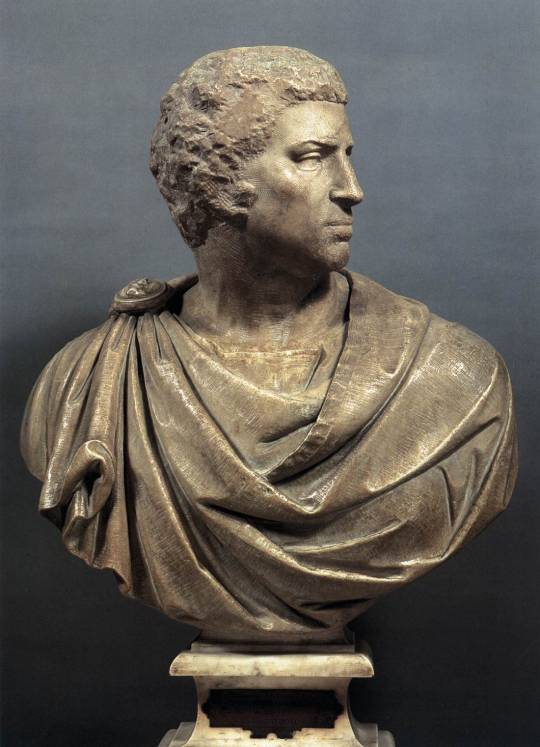
"Upon the general separation into two factions, when, Pompey and Caesar taking up arms against one another, the whole empire was turned into confusion, it was commonly believed that he would take Caesar's side; for his father in past time had been put to death by Pompey. But he, thinking it his duty to prefer the interest of the public to his own private feelings, and judging Pompey's to be the better cause, took part with him; though formerly he used not so much as to salute or take any notice of Pompey, if he happened to meet him, esteeming it a pollution to have the least conversation with the murderer of his father. But now, looking upon him as the general of his country, he placed himself under his command, and set sail for Cilicia in quality of lieutenant to Sestius, who had the government of that province. But finding no opportunity there of doing any great service, and hearing that Pompey and Caesar were now near one another and preparing for the battle upon which all depended, he came of his own accord to Macedonia to partake in the danger. At his coming it is said that Pompey was so surprised and so pleased that, rising from his chair in the sight of all who were about him, he saluted and embraced him, as one of the chiefest of his party." ~Plutarch's Life of Brutus
#brutus#marcus brutus#marcus junius brutus#ancient rome#the conspirators#roman republic#roman history#roman empire#rome#gaius julius caesar#julius caesar#pompey#gnaeus pompeius magnus#plutarch#quotes#ides of march
69 notes
·
View notes
Text
So... you could say Publius Crassus took after Pompey, but Sextus Pompey definitely took after Crassus (surrounded by ghosts of his father and brother and wants his fucking house back).
They exchanged sons somehow.
#crassus pompey cursed family#sextus pompeius magnus pius#publius licinius crassus#i connected two dots
32 notes
·
View notes
Text
Okay of these three characters (all historical and real) who would you most be interested in reading novel/s about?
Pompeius Magnus - rule breaker, golden boy, literally the most likable guy, builder of great buildings and most successful general ever pretty much. He also respects women which is just unheard of in his day to the point people make fun of him for it. He's also got a lot of tragedy and loss and the most poignant and cinematic death in all of history
Sextus Pompeius - "pirate", rebel, heart of absolute gold, honorable even to the people who deserve it least. Savior to hundreds, lord of Sicily. Dutiful son of a slain father. Also experiences a lot of loss. The last resistance to the totalitarian triumvirs. Very successful against them for years and largely forgotten by history. He was given the libelous title of "pirate king" but that just makes him sound cooler if you ask me
Pompeia Magna - fatherless at age six, tumultuous childhood that ends with her being put in the care of her uncle (this is where history ends and my made up story for her begins) used as a pawn to curry favor with a man she despises who was responsible for the ruin of her family, proud in spite of her humiliation. Taken under the wing of the "empress" who knew her as a child. She brushes shoulders with some of the big names of her day including the eventual successor to the governing of the empire. Without any true family to guard and protect her she is both more exposed to danger but also capable of more freedom of movement. She navigates the deadly waters of Rome to outlive all her enemies and see the men who put her in harms way brought to justice and to finally achieve her lifelong goal of living in security on her family's ancestral lands
Definitely put any further thoughts in the comments and tags
#roman history#ancient rome#roman empire#how often do you think about the roman empire#ancient history#pompey#pompeius magnus#sextus pompey#julius caesar#augustus#marcus agrippa#marcus antonius#mark antony#pompeia#livia#livia drusilla#Pompeia magna#rome#romans#historical fiction#historical novels#the roman empire is my roman empire
13 notes
·
View notes
Text
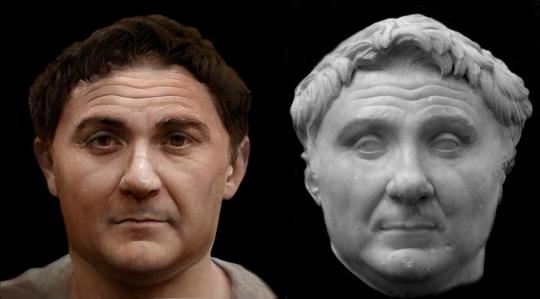
28 September 48 BC: Gnaeus Pompeius Magnus, in English known generally as Pompey, was killed in Egypt.
Here is the modern reconstruction of what he could have possibly looked like based on one of his portraits.
#ancient rome#pompey#gnaeus pompeius magnus#first triumvirate#late roman republic#he looks nice#but they did use to call him the boy butcher
23 notes
·
View notes
Text
had not previously considered this but. why is crassus(‘ unavenged ghost) the first named person in the pharsalia??????
#ignoring place names + quis furor o cives etc#i need to think about this more bcs like. umbra […] crassus inulta is SO adjacent to stat magni nominis umbra#which sadly is Not the first time pompey is named. it’s like the third. but all in the same chunk of text at least??#as in. it’s adjacent to stat magni nominis umbra in that there is a ghostly member of the triumvirate#(mimetic double decapitation bonus too)#either prominently named (crassus) + a ghost + not otherwise appearing in the poem#(yes crassus was dead when the civil war started so his appearance woukd be. unusual. but not unprecedented! julia’s ghost DOES appear!)#or prominently unnamed (ghost of a great name / the name magnus. lucan loves to get pompey to vanish into puns on his own name)#+ proleptically dead#+ arguably the Main Guy in the poem. i will not say the protagonist but like he is very much There And Important#anyway this post brought to you by me thinking huh i don’t think about crassus enough#thank you trikaranos 🫡#pharsalia#beeps
13 notes
·
View notes